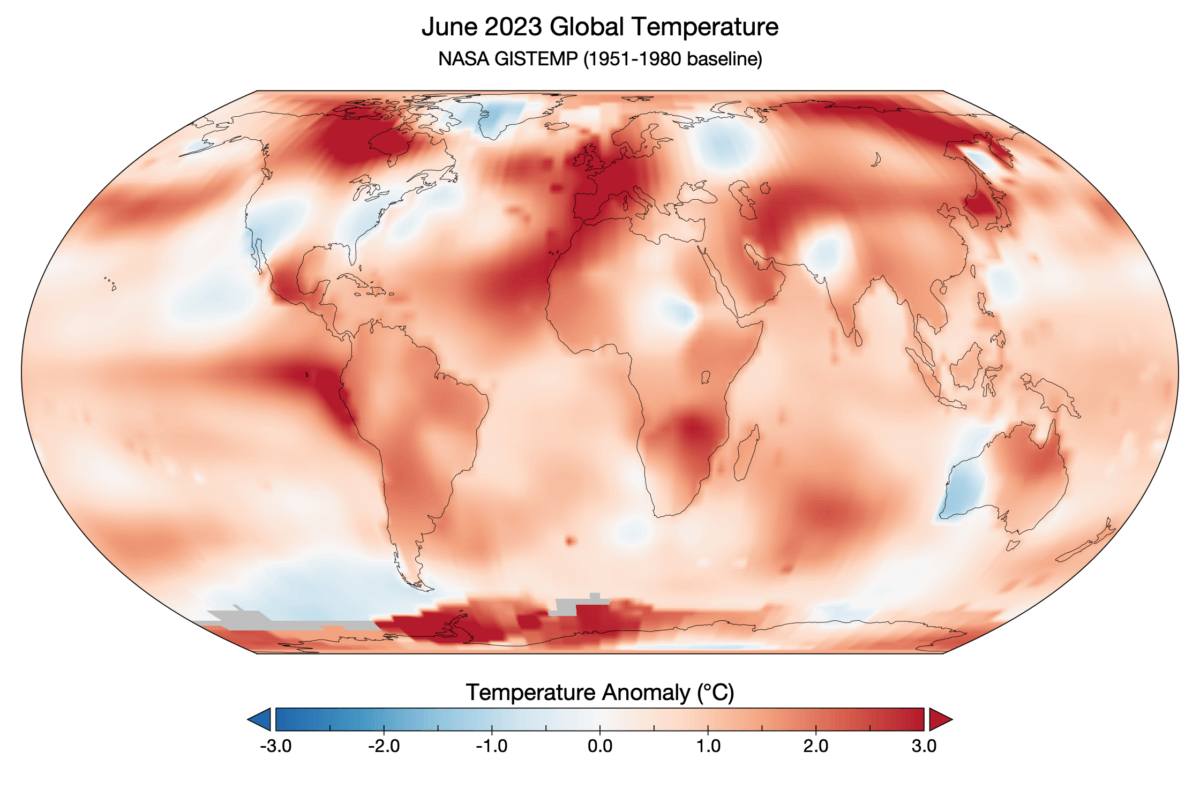GREENBELT, Md. — Some like it hot, but not this hot! Scientists at NASA say June 2023 is now the hottest June on record, according to global temperature data. The European Union’s Copernicus Climate Change Service and NOAA’s National Centers for Environmental Information confirmed NASA’s findings, deepening the concern that global warming could lead to even hotter and deadlier summers in the years to come.
“GISTEMP, NASA’s global temperature analysis, is drawn from data collected by weather stations and Antarctic research stations, as well as instruments mounted on ships and ocean buoys,” NASA officials note in a media release.
Scientists at the space agency’s Goddard Institute for Space Studies in New York regularly look over this data to account for abnormalities and maintain a consistent method of calculating global surface temperatures annually. According to the new findings, the scorching-hot ground temperatures line up with data also coming from satellites orbiting Earth, which have been collecting climate data since 2002.
NASA uses the period from 1951 to 1980 as their baseline average and then compare how global temperatures change from there.
Scroll down to see 9 tips for beating the summer heat

Summer is becoming a deadly season
As temperatures rise, the threat of heat-related deaths increases as well. With these new findings in mind, summer 2023 could end up being an extremely hazardous season around the globe.
A recent report by scientists in Europe revealed that more than 61,000 people on the continent likely died due to heat-related ailments in summer 2022. The terrifying new report found that nearly 40,000 people died across Europe over the space of just one month, with Italy, Spain, and Germany suffering the highest number of heat-attributable deaths.
How can you protect yourself against extreme summer heat?
- Stay Hydrated: Drink plenty of water throughout the day, even if you don’t feel thirsty. Avoid alcohol and caffeine, as they can dehydrate you.
- Use Air Conditioning: If you have air conditioning, use it. If not, try to spend time in public places that do, like libraries, malls, or community centers.
- Wear Appropriate Clothing: Dress in light-colored, loose-fitting clothing made of breathable materials like cotton. Wide-brimmed hats and sunglasses can protect you from the Sun’s rays.
- Avoid Peak Sun Hours: Try to stay indoors or in the shade between 10 a.m. and 4 p.m., when the Sun is at its hottest.
- Use Sunscreen: Apply a broad-spectrum sunscreen of at least SPF 30 to all exposed skin and reapply every two hours and after swimming or sweating.
- Eat Light: Opt for smaller meals more often. Eating large meals can raise your body’s temperature.
- Check on Loved Ones: Regularly check on young children, elderly family members, and pets, as they can be more susceptible to heat-related illnesses.
- Take Cool Showers or Baths: A quick way to cool down is to take a cold shower or bath. Even a quick splash of cold water on your face can help.
- Recognize Signs of Heat-Related Illnesses: Know the signs of heat exhaustion (like heavy sweating, weakness, cold, pale and clammy skin, nausea or vomiting, and fainting) and heat stroke (high body temperature, hot, red, dry or moist skin, rapid and strong pulse, and possible unconsciousness) so you can act quickly if necessary.
You might also be interested in:
- By 2100, climate change could destroy the ocean’s mysterious ‘twilight zone’
- Global warming: Here’s where climate change could lead to record-setting heatwaves soon
- Heat vision? Living in warmer weather linked to poorer eyesight


When’s John Kerry gonna fix it?